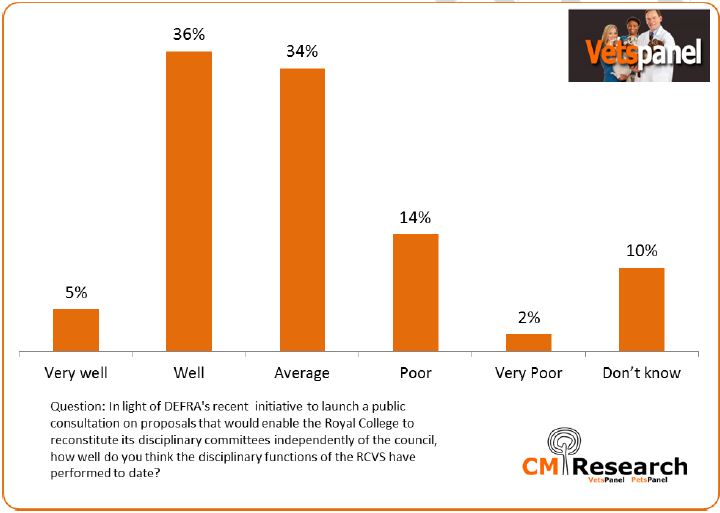The RCVS and its disciplinary committee could do better

A few weeks back DEFRA launched a consultation on proposals that would allow the Royal College to reconstitute its disciplinary committees independently of its council. The BVA has welcomed the proposal indicating that the disciplinary function of the RCVS could be improved. Expressing that there is a need for improvement suggests that current performance is not adequate. However, these were the views of the BVA but not necessarily those of the majority of veterinary surgeons.
This presented us with the opportunity to put the question to the veterinary community. In February this year CM Research, through Vetspanel, asked a sample of 320 veterinary surgeons their opinions on a number of issues. One of them was the performance of the disciplinary functions of the RCVS. The results clearly indicated that a large number of vets considered that the current performance was “Good”, however a larger number considered that there was potentially quite a lot of room for improvement as they rated performance as “average” or even “poor” or “very poor”.
How well has the disciplinary functions of the RCVS performed to date.

The opinion did not differ depending on the size, type or location of the clinics where veterinary surgeons worked or by their role as owner / partners or employed vets. We did, however, find variations in the opinion of veterinary surgeons by levels of experience (and age). It seems that the older and more experienced the vet, the more critical they became with the disciplinary committee.
The following where some comments made by veterinary surgeons:
“I don’t feel particularly supported by the Royal College – seems like they predominantly exist to police us rather than promote and support vets.”
“ Cases take far too long to reach a conclusion.”
“No great victories, no great mess ups”
To put these performance measures in context, we asked vets to rate the performance of the RCVS over the past year. Interestingly the RCVS performed significantly worse than one of its committees, suggesting that in comparison the disciplinary committee does not do such a bad job after all and that maybe the RCVS itself is in more need of improvement than any of its individual committees. And again it was the older, more experienced veterinary surgeons that are almost twice as likely to be critical of the RCVS than younger vets.
The reasons for this low performance perception are multiple, but overspend in the IT system and lack of financial clarity were mentioned frequently.
